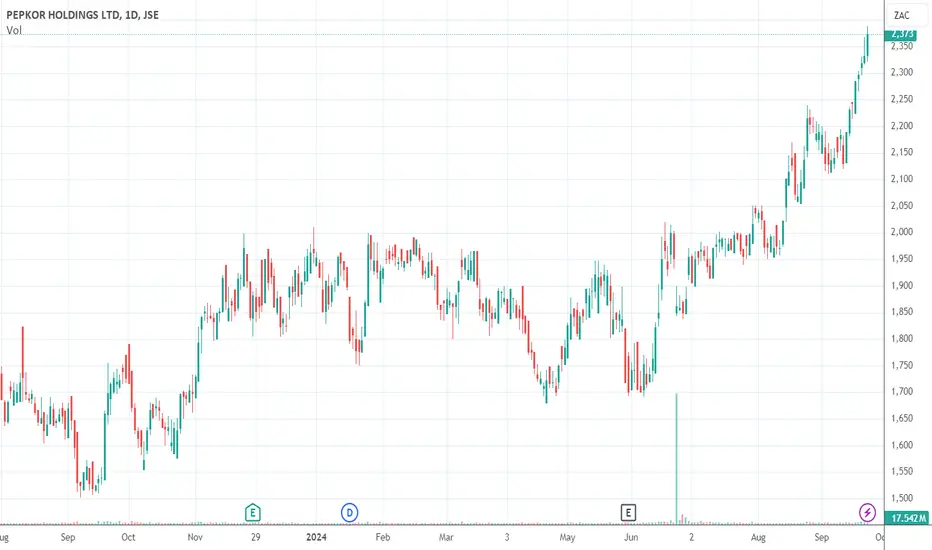Pepkor Holdings (PPH), formerly known as Pep, is 71.01% owned by Steinhoff International. Following the collapse of Steinhoff due to admissions of "accounting irregularities," Pepkor rebranded to distance itself from the negative publicity associated with its parent company. The group includes well-known retail brands such as Ackermans, PEP Stores, Bradlows, and HiFi Corporation.
Since Steinhoff's troubles in December 2017 and the impact of the COVID-19 pandemic, Pepkor's share price plummeted to as low as R10 per share in May 2020. However, the company staged a remarkable recovery, more than doubling in the following year. Pepkor raised R1.9 billion in an accelerated book-build, using the proceeds to reduce debt as a precautionary measure.
On 3rd February 2022, Pepkor announced the acquisition of 87% of the Brazilian clothing retailer Avenida. Later, on 13th April 2022, the company reported that its Isipingo distribution center suffered significant damage due to flooding in the Natal area, temporarily closing the facility. The company confirmed it had adequate insurance coverage to manage the losses.
In its results for the six months ending 31st March 2024, Pepkor reported a 9.5% increase in revenue, though headline earnings per share (HEPS) declined by 3.8%. The company stated, "Sales growth strengthened further in the second quarter - Market share expansion on three-, six-, and 12-month basis (Retailers' Liaison Committee (RLC) March 2024) - Recovery in retail gross profit margin - Avenida expansion accelerated and ahead of plan."
Technically, the share has been trending sideways and downwards since November 2021, and it remains vulnerable to fluctuations in consumer spending. While Pepkor is a solid investment, it could be impacted by lower consumer confidence and spending.
On 23rd September 2024, PPH was added to the JSE Top 40 index, replacing Amplats. This inclusion is expected to draw more institutional interest and potentially improve its trading volume and visibility in the market.
Since Steinhoff's troubles in December 2017 and the impact of the COVID-19 pandemic, Pepkor's share price plummeted to as low as R10 per share in May 2020. However, the company staged a remarkable recovery, more than doubling in the following year. Pepkor raised R1.9 billion in an accelerated book-build, using the proceeds to reduce debt as a precautionary measure.
On 3rd February 2022, Pepkor announced the acquisition of 87% of the Brazilian clothing retailer Avenida. Later, on 13th April 2022, the company reported that its Isipingo distribution center suffered significant damage due to flooding in the Natal area, temporarily closing the facility. The company confirmed it had adequate insurance coverage to manage the losses.
In its results for the six months ending 31st March 2024, Pepkor reported a 9.5% increase in revenue, though headline earnings per share (HEPS) declined by 3.8%. The company stated, "Sales growth strengthened further in the second quarter - Market share expansion on three-, six-, and 12-month basis (Retailers' Liaison Committee (RLC) March 2024) - Recovery in retail gross profit margin - Avenida expansion accelerated and ahead of plan."
Technically, the share has been trending sideways and downwards since November 2021, and it remains vulnerable to fluctuations in consumer spending. While Pepkor is a solid investment, it could be impacted by lower consumer confidence and spending.
On 23rd September 2024, PPH was added to the JSE Top 40 index, replacing Amplats. This inclusion is expected to draw more institutional interest and potentially improve its trading volume and visibility in the market.
Disclaimer
The information and publications are not meant to be, and do not constitute, financial, investment, trading, or other types of advice or recommendations supplied or endorsed by TradingView. Read more in the Terms of Use.
Disclaimer
The information and publications are not meant to be, and do not constitute, financial, investment, trading, or other types of advice or recommendations supplied or endorsed by TradingView. Read more in the Terms of Use.
